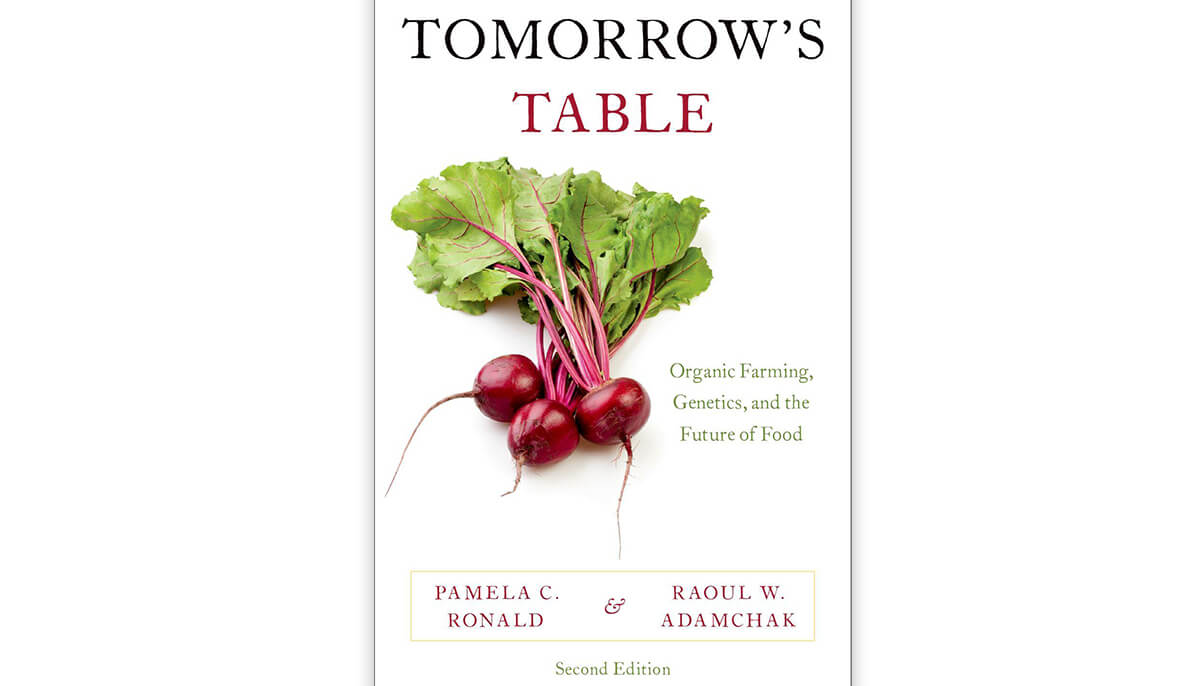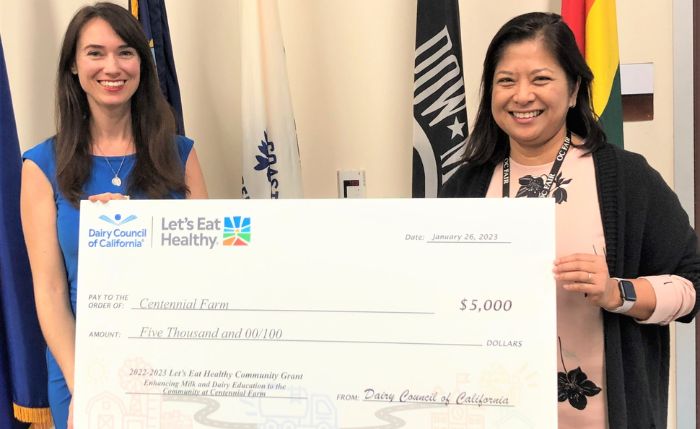Is there a place for both organic farming and plant genetics? The authors make a case for the future of food in their thought-provoking book.

By: Kristal Shelden, MPH, RDN
The Silicon Valley Registered Dietitian Nutritionist’s Book Club met to discuss Tomorrow’s Table by Pamela Ronald and Raoul Adamchak. The authors have a unique story; Ronald is a professor at the University of California, Davis in the field of plant genetics, while Adamchak is an organic farmer. They are a married couple working on different strategies to achieve the same vision: to feed and sustain the world. Tomorrow’s Table lays out a compelling case that both genetic engineering and organic farming are needed to feed the growing population and sustain the earth.
The book outlines challenges faced by all farmers, both organic and conventional, to produce adequate crop yield while sustaining the land and making a profit. Farmers do not want to use expensive pesticides but must deal with the insects and weeds that have the potential to destroy their crops if they do nothing.
Ronald and Adamchak discuss both organic farming practices and the innovations of plant genetics and how both approaches have advanced to impact environmental, nutritional and social issues. Organic farming, which is a response to the overuse of chemicals on conventional farms, aims to promote the health of the soil, the crops, the farmers, the environment and the consumers. Farms that use organic methods and biological technology create an ecosystem with diverse interactions, making healthy places to grow food and to work.
The authors examine the question, “Does organic farming yield the same as conventional farming?” The short answer is sometimes. It depends on the crop, the soil, the growing conditions and other factors. The authors cite a comprehensive study that found organic yield overall is 25 percent lower than conventional yield, yet they add that with specific organic farming practices yields can be very similar for some crops.
The book also makes a strong, evidence-based case for using plant genetics to increase yield while decreasing the use of pesticides that are harmful to the land and the farmers. Ronald reminds readers that genetic improvements to plants are not new. Throughout time, plant breeders have grafted plants to improve quality and yield. She has done extensive research on rice, which is a staple food for much of the world. Every year, 40 percent of the rice harvest is lost to pests and disease. Farmers rely on seed varieties that carry genes that are resistant to these common issues. Through genetic modification, Ronald’s lab developed a variety of rice that is resistant to flooding, and this variety produces threefold more grain than the conventional variety. Ronald’s 2015 TED talk provides a brief and informative summary of her work.
Although there is little debate about the need to improve food systems to feed the growing global population, there is tremendous debate on how to do it ethically. What is the best use of land and technology to maximize food production? What is the best dietary pattern that will have the least impact on the environment? What are the best methods to eliminate food waste in developed countries (where most waste occurs at the consumer level) and in less-developed countries (where food is often lost between the farm and the marketplace)?
No single dietary choice or farming practice is the answer for achieving a sustainable global food system. Vast differences exist between the needs of high-income countries and low-income countries. Farmers who produce barely enough food to feed their families require different solutions than farmers who feed a population with an abundance of food choices.
As discussed in the book, much of the world is vegetarian, but not by choice. When meat and dairy products are made available in sub-Saharan Africa, South Asia and East Africa, positive impacts on the health of children are seen. Initiatives promoting a vegetarian lifestyle will meet resistance in cultures that struggle with getting adequate nutrition. Economics, nutrition, culture and other sociological factors need to be considered when planning ways to feed the growing population.
Tomorrow’s Table presents credible and important information, though most of the dietitians in the group found the book “dense” and a slow read. One key takeaway was that food systems are complex, and simple solutions won’t work. A multidimensional approach is necessary to build resilient, sustainable food systems, and it is possible for both organic farming and genetic engineering to be a part of the solution. Oftentimes fears and distrust around agricultural science do not match the evidence. Keeping an open mind and being able to think objectively about facts will help bring useful dialogue. Learning more about advances in agriculture, in the fields of both plant genetics and organic farming, is something health professionals and consumers should pursue.
“To produce the volume and types of food to feed those diverse communities, we need a big and inclusive conversation. We need innovations whose benefits reach beyond specific and tiny slices of the population. We need to balance precaution and progress.” —Tomorrow’s Table
To learn more from registered dietitian nutritionists on timely nutrition topics, subscribe to the Let's Eat Healthy Ask a Nutritionist video series.

Kristal Shelden, MPH, RDN
Kristal Shelden, MPH, RDN
Kristal Shelden is Dairy Council of CA’s advocacy manager, driving the organization’s thought leadership strategies and communications.
Through our Let’s Eat Healthy Initiative, Dairy Council of CA proudly partnered with Centennial Farm to enhance its educational programming.

Working together spreads the message of nutrition security and the value of milk and dairy foods in healthy eating patterns across the life span.

Subscribe to our blog to stay up to date on the latest news, products, and more.